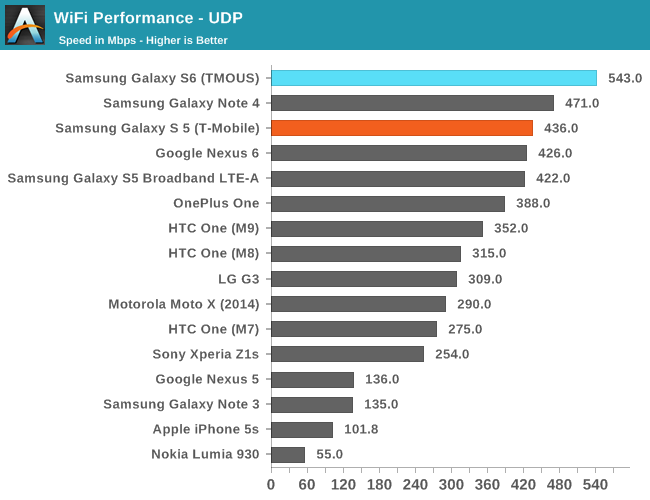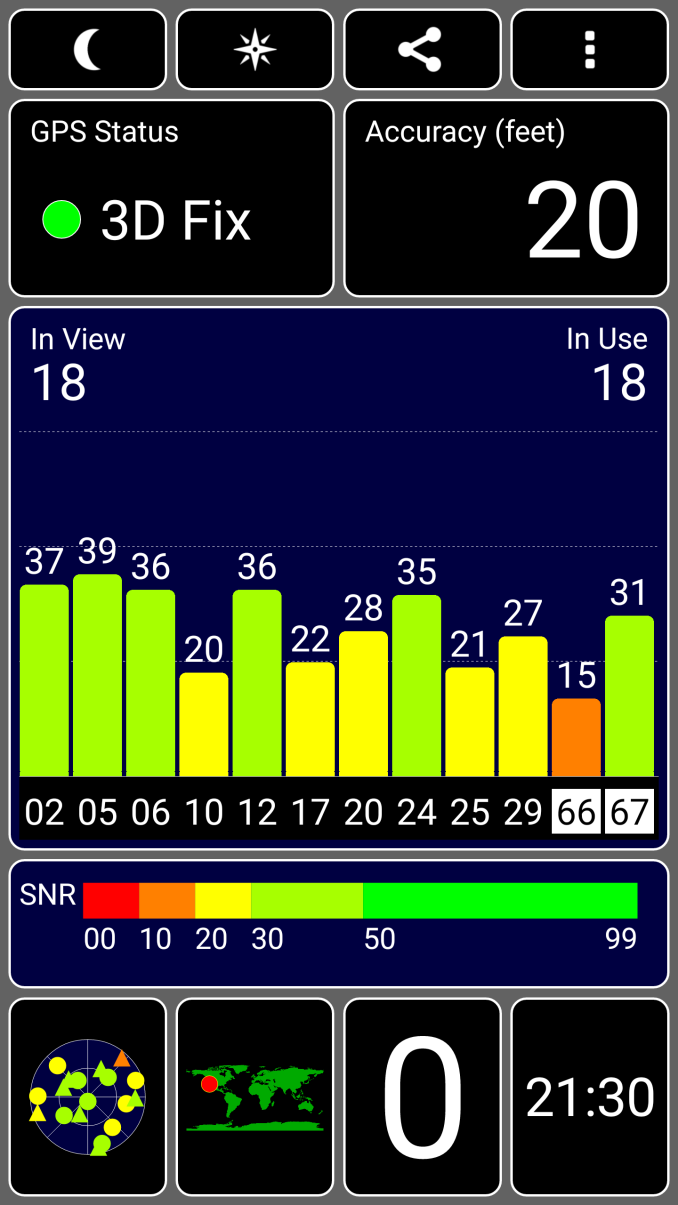The Samsung Galaxy S6 and S6 edge Review
by Joshua Ho on April 17, 2015 9:00 AM EST- Posted in
- Smartphones
- Samsung
- Mobile
- Galaxy S6
- Galaxy S6 Edge
WiFi Performance
As WiFi is still quite important on a smartphone for anyone on a relatively limited data plan, it's also important to test how well a device behaves when using WiFi. In order to do this, we use our standard iperf test to see how fast the device can send UDP packets. In the case of the Galaxy S6, we see that it shares the same BCM4358 WiFi/Bluetooth combo chipset that we first saw in the Galaxy Note 4. As always, in order to ensure maximum possible performance we're using an Asus RT-AC68U router to avoid issues with the router bottlenecking the phone.

As we can see, the Galaxy S6 manages to do better than anything else we've been able to test in recent memory. I'm not sure what's causing the difference in performance when comparing against the Note 4, but it's definitely possible that the antenna configuration has been improved to increase coherence and therefore the performance benefit that comes from MIMO.
GNSS Performance
In most of the Galaxy S6 variants, as there is no Gobi modem that could be used to provide GNSS location services it seems that Samsung has turned to Broadcom to provide satellite location services. In the case of the Galaxy S6, we see a Broadcom BCM4773 location chipset. This includes support for all of the major constellations including GPS, Beidou, and GLONASS in addition to SBAS, which helps to improve accuracy beyond what conventional GPS satellites can provide. To get a good idea for how good this system is I tried testing how long it took for a lock to happen on a clear night with airplane mode on. The Galaxy S6 managed to acquire a lock in 20 seconds which is likely to be a warm lock but a cold lock will likely take a minute without assistance data. After an additional 20 seconds I saw a peak accuracy of 20 feet, so there shouldn't be any notable issues with the GPS system. For the Galaxy S6 CDMA variants it's likely that location will be done using the MDM9x35 Gobi modem rather than the Broadcom solution used in the GSM Galaxy S6.
Misc
For the Galaxy S6, Samsung has fundamentally uprooted how they traditionally design their phones, and in the case of the entire radio architecture this is especially true. Instead of the standard Qualcomm modem, we see that Samsung has moved to the Shannon 333 GSM/LTE modem for the Galaxy S6 GSM variants. Given that this is likely to be the same modem that is in the Note 4 LTE-A it’s likely that this modem will ship as category 6, while we have reason to believe it's ultimately capable of UE category 9. However, whether the RF front-end is capable of handling 3x carrier aggregation of up to 450 Mbps on the downlink is a different question and is likely to be one that we won’t know the answer to unless support is added in an OTA update.
The transceiver, envelope tracker, antenna tuner, and most of the components that would traditionally be Qualcomm parts in a Snapdragon-equipped phone have also been replaced with Samsung Shannon components based upon the Chipworks teardown. In general though, I didn’t notice any issues with this choice of RF components although judging by the use of Qualcomm modems in the CDMA variants it’s likely that such a move was necessary in order to ensure good RF performance on CDMA networks but not GSM networks due to Qualcomm’s experience with CDMA2000. It's likely that anyone that has had previous experience with the CDMA Galaxy Nexus would be able to attest to this.
Unlike some other variants, we’ve noticed that the Galaxy S6 T-Mobile variant uses an Audience eS804 voice processor to enable hot word detection and S-Voice launching and is likely also active in phone calls and in any other scenario where noise cancellation and voice processing would be beneficial. The T-Mobile variant that we received also uses an NXP PN547 NFC module rather than a Samsung NFC module, but we did confirm that there is an ST-M digitizer used for the touchscreen and a Cypress CapSense PSoC for the capacitive keys.
Although I still don’t have the equipment to test speakers properly, subjectively the audio quality of the Galaxy S6’s single downward-firing speaker is good. The volume gets high enough that I never really used it on maximum volume for videos, but it’s still annoying to have to cup my hand to ensure that sound is going towards my face rather than traveling away. Overall the M9 still has much better speakers for a good media experience, but there’s nothing wrong with the speaker on the Galaxy S6 for casual use. I definitely found myself using it less than the front-facing speakers on the M9 though.











306 Comments
View All Comments
Richa - Friday, May 15, 2015 - link
Am from India - Bangalore. I bought Samsung S6 edge 64 GB on 12th April 2015 and got to know battery is discharging rapidly within first week of use. I spoke to customer support and sent it for service center. Service center person and his manager said phone does not have any problem and returned same defect phone without fixing. Samsung is least bothered about their customers and service center guys are too unprofessional. Please help me what can be done. Battery back up is less than 3-4 hours.Samsung has the worst customer service. First they sell you defective pieces which starts showing problem within a week of purchase and then they will ask you to visit the service center 3-4 times a month just because their technical team is not strong enuff to recognizee the problem. Samsung doesnt value customer time money ... it has just some stupid people sitting at the call center whose work is to fool you and simply waste your time but wont provide genuine service or product .Samsung is the other name of Customer Harassment. My personal Experience which I am going through these days.
techconc - Tuesday, May 19, 2015 - link
@Richa:You sound surprised. Why? Is there anything in your experience history with Samsung or even stories of their customer service that leads you to believe this is an anomaly? Your experience sounds pretty consistent with my experience with them.
An Droid - Monday, May 18, 2015 - link
Try reading the article again. Maybe you will then grasp the advantages of UFS over eMMC. If you still do not understand it, look at the graphs (the pictures).schilling - Wednesday, May 20, 2015 - link
Can someone explain why the video bit rate is so high? It is common for 1080P30 H.264 video to be in the 3-5Mbps range. I get the idea of increasing bit rates to improve quality, but 17Mbps seems ridiculous. I've seen many studies that clearly show that 1080P30 H.264 quality improves very slowly for bit rates above 5Mpbs. Netflix streams 1080P30 in the 1-2Mbps range; and yes their are artifacts, but this is 17-8x higher! The only logical explanation is that Samsung Exynos 7 is taking radical short-cuts in their H.264 CODEC. For example, using only I-Frames, or keeping a very small motion search area.Does anyone have insight to this? Has anyone viewed their stream with a CODEC analysis tool like StreamEye?
Why is Samsung's bit-rate so ridiculously high?
The Rogue Tomato - Saturday, May 23, 2015 - link
Removable battery and no microSD card isn't a big deal anymore. You can get a great quick-charge-capable $20 10,000 mah external battery now that you can use with your own phone, or your girlfriend/wife/boyfriend/husband's phone, too. Just today I wanted to be able to have an extra power source for my phone and my wife's phone. A $20 thingy would be ideal for that.And although I have one with my Note 4, I don't see the point of having a microSD slot anymore. I'd rather have the faster internal storage. It's not like I'm going to carry around 100 movies on my phone. If I really want movies, I can put them on a cheap thumb drive and use OTG.
bloosted - Tuesday, July 7, 2015 - link
You guys should revisit this and do an in-depth on the different camera sensors. Now that some time has passed, it's become very clear that the isocell sensors that some gs6 owners randomly end up with are greatly inferior to the sony sensors that you originally tested. Interestingly, it seems most (if not all) of the online reviews of the s6 and s6 edge were done on phones containing the fantastic sony sensor, which received near universal praise. Tom's hardware just did a review of the two sensors and found the isocell sensor greatly lacking.